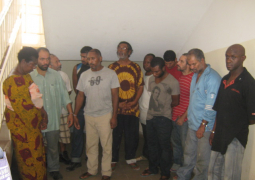
The Gambia Chamber of Commerce and Industry, GCCI, in collaboration with the International Monetary Fund and the Ministry of Finance and Economic Affairs Tuesday organized a day-long economic outreach seminar on tax reforms in The Gambia.
The seminar, aimed at disseminating the findings of the study, provides an opportunity for the private sector, government institutions and the general public to interact, ask questions and learn about the subject.
Speaking at the opening ceremony, Bai Matarr Drammeh, president of the GCCI, said the demand for exports in Africa has fallen; commodity prices declined and remittance flows may be weakening.
According to Drammeh, who is also the president of Federation of West African Chambers of Commerce and Industry (FEWACCI), like the rest of the world, the continent is feeling the impact of the global financial and economic crisis, and the economic slowdown is also likely to increase credit risk and non-performing assets, weakening the balance sheets of financial institutions and corporations.
“The tighter global credit and investors risk aversion have led portfolio flows to reverse, deterred foreign direct investment in our countries and made trade finance more costly,” he said, adding that the squeeze on the financial flows implies that the continent will once again rely greatly on the multilateral financial institutions, that is, the IMF, the World Bank and the African Development Bank.
While underscoring the importance of taxes, the GCCI president said taxes account for almost all of government revenue in most African countries.
“Increasing tax revenue can have a significant impact on improving domestic resource mobilisation, provided it does so without discouraging private economic activity,” he said.
Noting that Africa loses significant amounts of its own much-needed resources through capital flight, Drammeh said the estimates of capital flight from Africa vary considerably, and that according to the African Union US$148 billion leaves the continent every year because of corruption.
Mod Secka, permanent secretary at the Ministry of Finance and Economic Affairs said the reforms seek to improve effectiveness and efficiency of tax policies for improved domestic revenue mobilization, and creation of a better investment climate.
“As a result of these reforms, the government amalgamated domestic tax department (DTD) and the Customs and Excise Department (CED) leading to the creation of Gambia Revenue Authority (GRA),” he said.
According to him, despite the improvement in resource mobilization with the creation of GRA, emphasis is still being made towards strengthening tax administration and tax collection.
He stated that in its efforts to modernize and strengthen the tax system for improved domestic resource mobilization in support of national development, the Government of the Gambia has made a commitment to replace the existing sales tax with Value Added Tax (VAT) by January 2013.
This, he went on, will provide a great opportunity to widen tax base, as the VAT is seen as more broad-based revenue enhancing consumption tax than the current sales tax, which applies to limited domestic supplies of goods and services and imports.
“We believe the VAT has the ability to enhance both domestic and international competitiveness, since the tax does not stick to local businesses and exports only. “In 2011, government will further consolidate these reforms in addition to undertake studies aimed at rationalizing and harmonization of taxes and duties, stepping up monitoring and evaluation of performances of key tax revenue sources and systems; ensuring transparency and standardization in application of tax rules and procedures; and encouraging greater compliance,” PS Secka added.
Among the speakers at the meeting, which included a question and answer session, was the IMF resident representative, Meshack T. Tjirongo, and David Dunn, the IMF mission chief.
Read Other Articles In Article (Archive)

APRC national mobilizer calls for calm ahead of by-election
Feb 13, 2015, 10:38 AM




